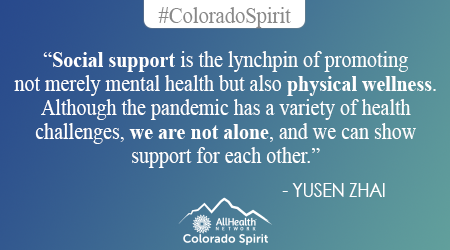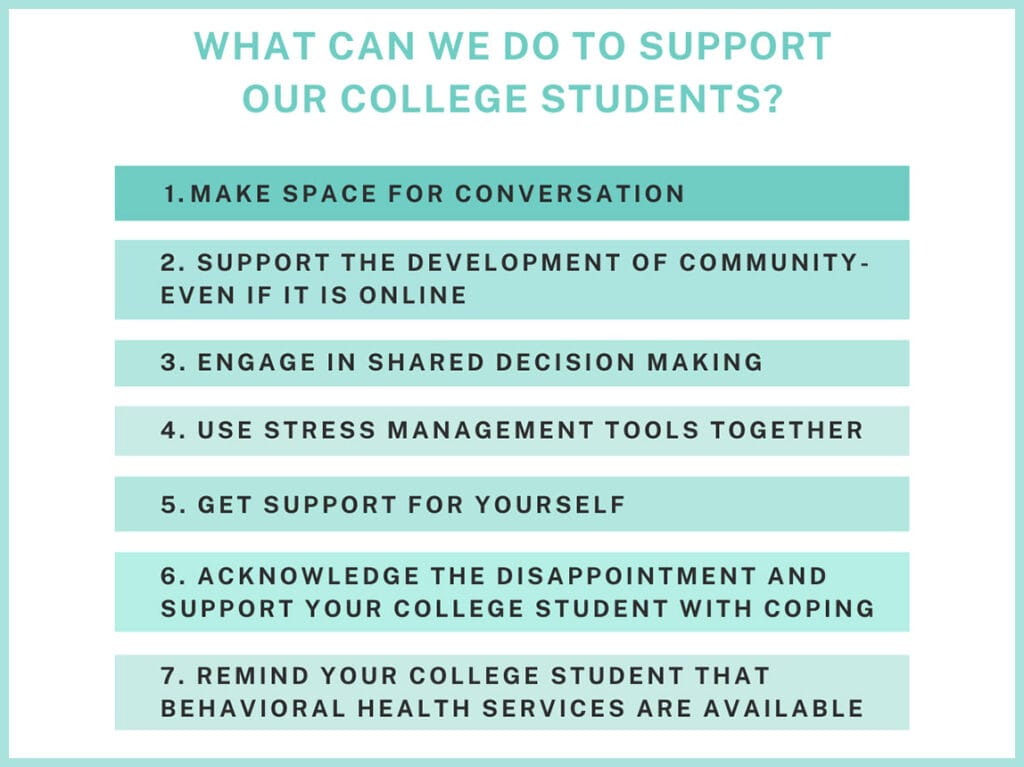In past weeks, we have focused our content on supporting kids and teens. We have not touched much on how the pandemic is impacting college students, yet we know this is a group whose lives and plans have been disrupted a great deal. Research suggests that collegiate mental health and well-being have been impacted in numerous ways by the pandemic. Financial hardship, barriers to accessing online learning, delayed academic requirements, and reduced access to campus behavioral health services are some of the very real challenges many students are facing right now. Many others are coping with intense grief related to the loss of traditions, celebrations, and rites of passage that are being changed, postponed, or canceled.
What can we do to support our college students?
Many of the same tips we have shared for supporting younger students will be useful for supporting college students too, and here are a few additional suggestions.
Make space for conversation and keep talking with them about their reactions – We know, we know…people this age will not always want to talk to parents and family about their feelings. And, we need to keep making space for this. Allowing students to share the disappointment, sadness, worries, fears, and anger without fear of judgment is important. We need to let them know they are not alone, and that we are there to support them, help problem-solve, or just sit with them. Read about how writer, Wendy Miller, gave her son space and was eventually able to talk to him about both their reactions to finding out his 1st semester would be entirely online.
Support the development of community, even if it is online – We know that the support of others in a community is what helps us as humans navigate loss and stress. The community students have access to right now might look different, but they are crucial. Dr. Melissa Venable explains, “Developing an online community can be difficult, but is essential . . . This is particularly true now, as students used to the vibrant community of campus-based programs are experiencing increased stress and isolation.”
Engage in shared decision-making when possible – We understand that not all decisions about college will be ones students can make independently. And, as parents, we might feel the urge to try to control the situation and make choices for our students. This is a natural response to the loss of control that many of us feel during the pandemic. The challenge is that taking control and taking decisions out of our college students’ hands will likely create more resentment and distress for our students. Alternately, some of us may leave the decisions completely to our students. This can be difficult as even the most mature college student is still developing cognitively, so leaving them on their own to make difficult decisions during a highly stressful time is not ideal. When possible, engage your student and important others and discuss options.
Use stress management tools together – The same basics we have been talking about in terms of physical movement, balanced eating, sleep, time outside, calming strategies, and daily structure will help college students as much as adults. Not only will this help respond to your college student from a place of lower stress, you will also be supporting your student in their wellness practices.
Get support for yourself! – There is a lot of uncertainty in the world right now and there is no one clear “safe” course of action. Each choice comes with pros and cons and many decisions these days involve some sort of risk assessment. This takes a toll on us all. If you are supporting a college student in their decision-making process, things will go more smoothly if you are able to respond from a lower stress place. Having trusted others who support you, solid routines for stress management, and ways to have grace and compassion for yourself will help you support others in your life.
Acknowledge the disappointment and support your college student with coping – Even when students are not disappointed about the same things we would be disappointed about, their loss and grief is real and intense. The JED Foundation offers specific tips on dealing with disappointment.
Remind your college student that behavioral health services are still available during the pandemic – There are many affordable online counseling and peer support options available, including some nationwide companies (a quick internet search for online therapy will yield many results and this American Psychological Association article from 2017 speaks to some of the benefits and cautions of these models). Local mental health support is also available through college campuses, community mental health centers, and other local therapy organizations and support networks. One benefit of going the local route is that, while many of these services may still be provided through telehealth for the time being, these professionals know about other local resources and can help students get connected to those as well.
Would speaking to someone help?
AllHealth Network, along with other community mental health centers, is continuing to provide services via telehealth and by phone. Our Crisis Walk-in Center remains open 24/7 and offers in-person care to those experiencing a mental health crisis. For more information and to get connected with our services, please call 303-730-8858. To learn more about what other community mental health centers are doing, please visit the Colorado Behavioral Health Council COVID-19 website.
If you are experiencing a mental health crisis and are in need of immediate assistance, please call the Colorado Crisis Hotline at 1-844-493-TALK (8255) or text TALK to 38255
How do you know if you’re experiencing a mental health crisis? Click here to learn about mental health crisis warning signs to look out for from the National Alliance on Mental Illness (NAMI)


